(Article medically reviewed by Dr. Zac Hyde M.D
Can Eggs Boost Male Hormone Production?
Every five years or so, eggs switch from being your body’s best friend to its very worst enemy.
And while the doctors can’t decide whether these yolky treats are good for your heart, some very smart people have decided they’re definitely good for your testosterone levels.
So much so, in fact, that they’re recommending as many as three dozen a day!
Is it all hype or is the “egg diet’ the real deal?
Let’s take a closer look…

Vince Gironda’s 36 Eggs a Day Diet
Long before Arnold or Lou Ferrigno, there was Vince Gironda.
A Bronx-born professional bodybuilder, this muscle-bound legend sadly passed in 1997 at the ripe old age of 80.
However, before he left this world, Vince passed on a lot of advice on how to get (and stay) properly shredded.
One of the biggest and strangest of the tips was what he called his “36-Eggs-a-Day Diet.”
Gironda proudly referred to this special diet as “one of the most anabolic in the world.”
In fact, it’s been called “almost as good as steroids” by many of the people who’ve decided to take Vince’s advice.
But while hyperbole may be fun, I’m sure you’d rather hear some actual evidence instead.
Luckily, Gironda developed the diet with his own personal doctor, who kept detailed notes on the entire experiment.
Since then, lots of other scientists have been able to perform their own research as well.
The Egg Diet Helped Burn Victims
One of the most powerful medical steroids to hit the market was Dianabol, also known as methandrostenolone.
After it arrived on the scene, doctors began doing tons of studies into how this new drug could benefit their patients.
One of the first discoveries related to Dianabol what that it could drastically speed the healing process of people who had suffered severe burns.
Why?
Well, it turns out that Dianabol’s unique chemistry provided it the opportunity to create a positive balance of nitrogen in the body.
And a nitrogen surplus means more protein is available for building and repairing tissue in the body.
Or put another way, Dianabol is pro-growth or Anabolic.
However, it wasn’t until a groundbreaking 1975 study that this same Anabolic action was tied to eggs.
In fact, the doctor who authored the study literally said that eating large quantities of eggs was vital to reducing complications in burn patients.
QUOTE:
A regime involving the dietary management of 8 severely burned patients has been described, the main feature of this diet being the high egg intake.
No pathological levels of serum lipoproteins or cholesterol were attained. Serum proteins from an initial low level reached normal values within a relatively short time.
It is felt that a high egg diet is a valuable and safe addition in the management of severely burned patients.
Eggs and Testosterone (From the Hospital to the Gym)
Anabolic steroids and bodybuilding have a long history.
The term “anabolic” simply refers to the promotion of metabolic activity, the building of muscle, and the secretion of hormones.
Sure, synthetic anabolic steroids can do a lot of damage, but the natural stuff is key to many of your bodily functions.
Why?
Because the primary hormones that fall under the “anabolic” banner are estrogen, growth hormone, insulin, and – you guessed it – Testosterone.
It was around the time that Vince was transforming his own physique that information about steroids was making it to the gyms of the world.
And while there were studies going on regarding Dianabol and athletic performance, Gironda and his doctor opted to take the dietary route rather than pump Vince’s body full of an unproven drug.
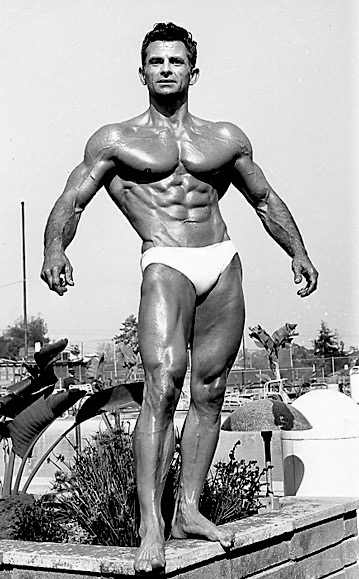
While eggs were already a staple in the bodybuilding world due to their high protein levels, he and his doctor soon discovered that three dozen eggs were a quick ticket to serious results.
Here’s a summary of what the two men discovered as they tweaked Gironda’s diet:
- Bodybuilders need a positive nitrogen balance to be in an anabolic state
- This is usually accomplished by eating high levels of quality protein
- The more frequent the protein is ingested, the better-supplied your muscles will be
- Eggs are the best (and cheapest source) of high-quality protein
- Eggs can also be more easily digested than meat
- By keeping yourself in an anabolic state, your body will produce more anabolic hormones
In a way, Gironda and his doctor had found a “natural anabolic steroid” in the form of the incredible, edible egg.
Not only was it cheap and easy to get, but there was nothing inherently “medical” about consuming them, as there would be if Vince had started a daily dose of Dianabol.
So, should you eat 36 eggs a day? Probably not.
However, as you’ll see below, there is plenty of reason to consider adding more eggs to your diet.
How Eggs Help Fuel Your Testosterone Levels
There’s a lot more to eggs than just protein. In fact, despite their small size and apparent simplicity, eggs are among the most nutrient-dense foods on the planet.
In fact, you might call them a nature-made multi-vitamin.
In this section, we’ll take a closer look at just what you’re getting when you crack open your morning breakfast.
Cholesterol, Eggs and Testosterone
As I’ve already said, there’s a big discussion to be had regarding eggs and cholesterol. However, we’re not here to talk about your weight or heart health.
Instead, we’re focused on testosterone production, and cholesterol is one of the primary building blocks for your sex hormones.
Your Leydig cells, which are found in your testicles, actually use cholesterol from your bloodstream when manufacturing testosterone.
According to studies like this, Cholesterol is metabolized to pregnenolone and then to testosterone once introduced to the body.
So by increasing your cholesterol levels, you’re giving your testicles more fuel for the fornication fire.
Eggs Contain Choline
This seldom-mentioned nutrient is similar to B vitamins in a lot of ways – something we’ll talk about a little bit later.
It is mostly used in the membranes surrounding your body’s cells, but it also helps regulate mood, memory, and muscle control.
Like zinc, deficiencies in choline have been tied to erectile dysfunction.
Why?
Because choline is essential to the release of nitric oxide, which is responsible for putting the bone in your boner.
As an added benefit, high blood levels of choline have also been linked to improved energy and sex drive, so you can put that nitric oxide to better use.
Of course, eggs are one of the best natural sources of high-quality choline.
Eggs Contain Vitamin E
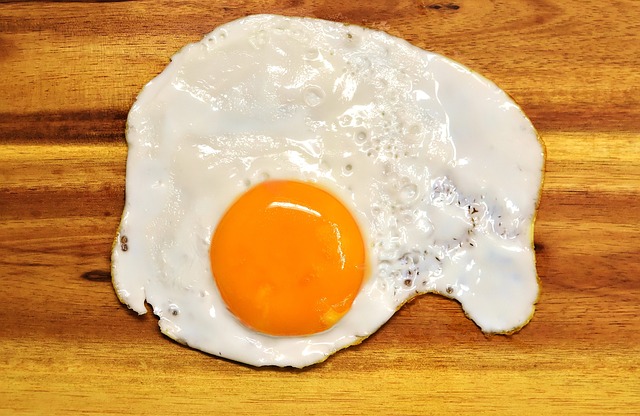
Vitamin E is a powerful antioxidant, which is why it’s so great at protecting cells from free-radical damage.
This is good news for all of your organs, but it’s worth nothing that Vitamin E is particularly focused on your package.
Specifically, it’s been shown to improve sperm motility and function while simultaneously multiplying their numbers.
That’s why a daily dose is highly recommended for men who are trying to get their partner pregnant.
Iodine, Eggs and Testosterone
Iodine is one of the most important trace minerals in the world, especially when it comes to your hormones.
For instance, iodine is critical to the proper function of your Leydig cells and thyroid gland, which releases both T3 and T4 hormones.
These, in turn, power your metabolism and help your body stay lean, mean, and healthy.
If you happen to become deficient in iodine at any point, it will end up delivering a pretty serious punch to your hormone levels.
One of the most noticeable effects will be a rise in estrogen production coupled with a decrease in testosterone.
It can also raise your prolactin levels, which can lead to the development of the dreaded “man boobs.”
Selenium, Eggs and Testosterone
Like iodine, selenium is primarily related to your thyroid function.
Still, as we mentioned above, this gland helps you make more sperm-producing Leydig Cells.
This is crucial to reproductive health as it can reduce the number of damaged, malformed, or slow moving sperm in your average load.
Of course, even if you’re not planning on starting a family at the moment, you should still want to keep your baby factory in tip-top shape.
Selenium helps here, too, because – much like Vitamin E – it is a powerful antioxidant.
Specifically, it can reduce inflammation throughout the body, including the testicles, which will allow them to focus on producing more testosterone.
Magnesium, Eggs and Testosterone
Magnesium is one of the most important nutrients in your body.
In fact, it is a cofactor in more than 300 individual enzyme systems, helping to control biochemical reactions ranging from protein synthesis to blood sugar regulation.
The former, as you might have guessed, is key to your ability to produce sufficient levels of testosterone.
You see, when your body is deficient in protein, it releases a trigger known as Sex Hormone Binging Globulin, or (SHBG).
This can end up binding to your testosterone, gunking it up and ultimately preventing your body from using it.
However, with a proper supply of magnesium, this doesn’t happen.
It’s a bit like that Star Trek episode with the energy alien stuck on the Enterprise’s hull.
In this case, magnesium is what powers your “shields” and keeps that pesky alien from screwing up your seven-year mission.
Eggs Contain Omega 3 Fatty Acids
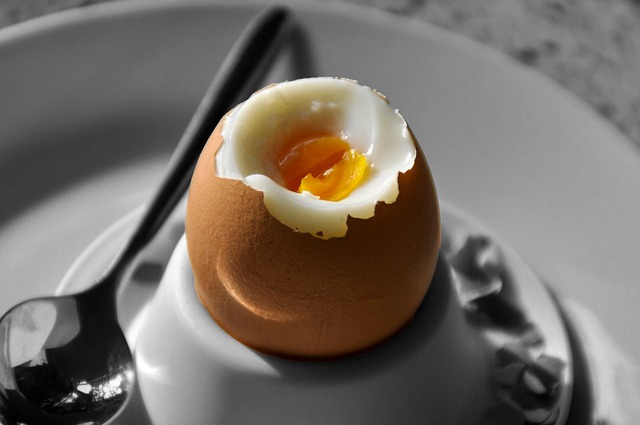
Few nutrients have received as much positive press as Omega 3 Fatty Acids.
And why not?
They are literally essential to maintaining the walls of every single cell in your body.
On top of that, they power your immune system, blood vessels, heart, and lungs.
However, have you ever heard of Omega 6 Fatty Acids? Unfortunately, most people have way more of the former than the latter (hence its popularity as a supplement).
The problem with this is that high levels of Omega 6 can lead to an inflammatory response that actually reduces testosterone production!
Omega 3, as you might have guessed, is an anti-inflammatory that keeps this from happening.
So, while the marketing machine behind Omega 3 might not get into the specifics, there’s more to supplementation than just a “healthy heart.”
High quality pastured eggs can help you maintain the Omega 6 / 3 balance, even if you’re not eating three dozen a day.
B Vitamins Eggs and Testosterone
B vitamins are known as the “energy supplement.”
In fact, if you’ve ever had a B vitamin shot or taken a 5-Hour Energy, you know exactly what I’m talking about.
Not only do they give you a nice mental and physical boost, but they help your body process the food you eat into fuel.
That said, several nutrients in the B vitamin chain have also been closely tied with testosterone production.
Specifically, we’re talking about B12.
Like many of the nutrients on this list, B12 goes relatively unnoticed by most individuals until they develop a deficiency.
That’s when the symptoms of lowered testosterone production and inhibited testicular function will start to make an appearance.
To make matters worse, there aren’t a ton of dietary sources for B12. However, one of the most common is our good friend, the egg.
Eggs contain Zinc
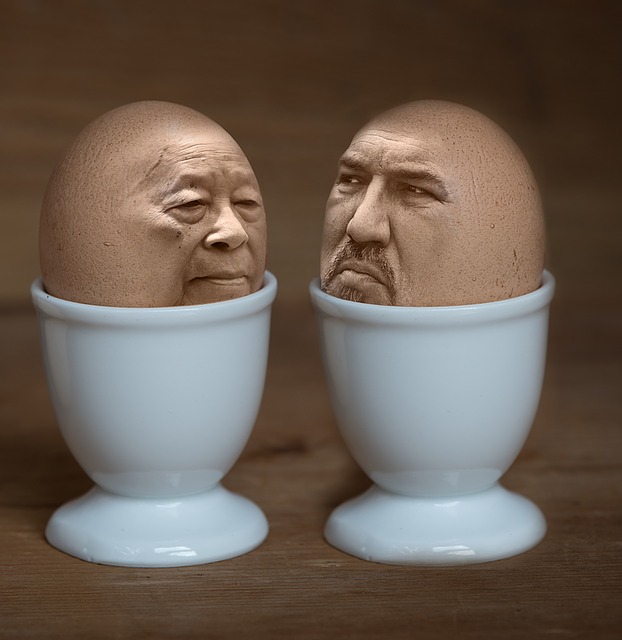
I’ve written entire articles about how zinc can impact the overall function of your man bits.
Indeed, a zinc deficiency is one of the quickest ways to zap your sexual energy and lower your testosterone production.
And while the majority of the deficiencies I’ve listed in this article are somewhat hard to develop, zinc deficiency is super common here in the Western World.
And we’re not just talking about reduced testosterone here, either.
Studies show that zinc is a key element in your body’s ability to maintain healthy blood pressure levels, which in turn ensures a healthy supply of nitric oxide to your genitals.
Remember, without a reliable supply of NO, there won’t be any gas in your gonads to support healthy erections.
Eggs Contain Vitamin D3 & K2
While we’re on the subject of healthy erections, let’s talk about two vitamins that are integral to the process: D3 and K2.
In the case of vitamin D3, you have a vitamin that has only two primary sources. The first is the sun, which most of us don’t get enough of, and the second is our diet.
Fortunately, with enough D3 in your body, you can enjoy reduced erectile problems, improved blood vessel health, and even harder erections.
With a sufficient supply, your arteries will be more elastic and therefore capable of easily moving blood to various parts of your body (hint, hint).
It also helps boost the production of both testosterone and sperm by supplying your testes with more fuel.
Lastly, you need to consider the ways in which these two vitamins interact.
You see, despite being completely different nutrients from completely separate groups, K2 and D3 have a synergistic relationship.
With enough K2 in your system, your body can actually use the D3 more efficiently, leading to improved testosterone synthesis.
Eggs and Testosterone FAQ: Answering All Your Egg Questions
As you can tell from the information above, it’s no surprise that Vince Gironda experienced the results he did when he started eating a month’s supply of eggs every day.
They contain almost every single mineral and vitamin your body needs, and many of those vitamins and minerals directly focus on your body’s sexual or hormonal health.
You get high levels of choline, which many of us are deficient in, loads of every single essential amino acid, high levels of antioxidants, and enough iodine and selenium to keep your thyroid happy for a long time.
In fact, eggs have also been shown to contribute to fat loss while simultaneously triggering improved lean muscle development.
And while the benefits are clear, I want to finish up the article by addressing some of the big questions I often get regarding these yummy little superfoods.
As we finish, we’ll circle back around to Vince and his three-dozen-eggs-a-day diet to discuss whether it’s really necessary to blow half your monthly food budget on eggs alone.
Raw or Cooked Eggs?
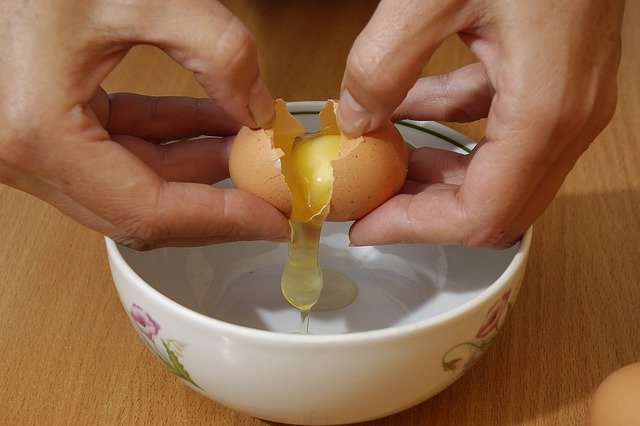
We all remember that scene at the beginning of Rocky where Sly Stallone cracks a few eggs into a glass and drinks them down.
And while consuming raw eggs does carry a little bit of a risk (not as much as we’ve been led to believe), lots of big-time bodybuilders swear by this approach. So what’s the deal? Is raw better?
Well, if you look at it from a nutritional standpoint, the two are almost exactly the same.
- Raw eggs break down into 6 grams of protein, 4.8 grams of fat, 0.4 grams of carbs, 186 mg of cholesterol, and 41 units of Vitamin D.
- Cooked eggs break down into 6 grams of protein, 6 grams of fat, 0.6 grams of carbs, 187 mg of cholesterol, and 44 units of Vitamin D.
Again, fairly negligible.
However, you might have heard about this study, which shows that our bodies absorb far less protein (less than 50%) from raw eggs than we do from cooked (around 90%).
While this study is legit, it only involved five test subjects.
That’s so small as to be almost anecdotal as evidence. Still, if the difference is minimal, maybe the anti-salmonella route is best?
OK, But What About Cholesterol?
Back in our section on egg nutrients that aid in testosterone production, I mentioned that there was a “bigger conversation” to be had about cholesterol.
Well, it’s time to have it.
You see, the main reason why doctors remain on the fence about how healthy eggs are for you has to do with their relatively high cholesterol content.
As you’ve probably heard, cholesterol has been linked to the development of cardiovascular diseases.
However, as with most things that can be summed up in one sentence, it’s just not that simple.
You see, there are two specific types of cholesterol.
One is HDL (high-density lipoprotein), and the other is LDL (low-density lipoprotein). The former is often referred to as “good cholesterol” while the latter is – you guessed it – “bad cholesterol.”
Eggs have been shown to predominately increase the levels of HDL, or “good cholesterol” rather than LDL.
In fact, study after study has failed to establish a bridge between eggs and increased instances of cholesterol-related cardiovascular disease without there being other factors present.
Good examples include a sentient lifestyle, a family history of heart disease, and other poor dietary factors.
Then there’s the fact that the cholesterol released by the eggs is key to the body’s production of testosterone, which – in turn – can empower you to stay more active as you age.
So, if you’re hitting the gym and enjoying some cardio on a regular basis (as you should), the chances of a high-egg diet negatively affecting your heart are extremely low.
Really? 36 Eggs a Day?
As impressive as the three-dozen-eggs-a-day diet sounds, we need to remember who this diet was designed for (and promoted by).
That is to say: very few of us are professional, full-time, 8-hours-in-the-gym-a-day bodybuilders like Vince Gironda.
This means that the benefits of eating so many eggs will start to taper off the more we add to our diet.
If I had to put a number on it, I’d focus on eating between 4 and 12 eggs per day, with the latter only being for truly motivated body builders and athletes.
At a dozen per day, you’ll be consuming about 72 grams of high-quality protein, 60 grams of fat, 7.2 grams of carbs, 528 units of Vitamin D, and 348 units of Omega 3.
That’s a huge boost for your body’s ability to build lean muscle, stay energized, and keep your thyroid pumping along nicely.
However, you’ll also get 2244 mg of cholesterol, so your testicles will have tons of fuel to start making testosterone.
Of course, you can’t just slam 12 eggs every day and sit on the couch playing Madden (RIP).
You’ll need to get that metabolism pumping so that all those nutrients go to the right places.
Eggs and Testosterone Conclusion
Eggs are one of the most potent superfoods on the planet.
This may be why they’ve been a staple of the human diet for around 6 million years.
In fact, did you know that in the early days of San Francisco, miners and prospectors were paying the equivalent of $30 an egg because there was such a demand for the protein-packed provisions?
Luckily, if you decide to boost your body with half a dozen or so eggs a day, it won’t cost you anywhere near as much.
So feel free up your intake of eggs, especially if you’re an active individual.
Just don’t go overboard unless you’re ready to ditch your day job for a life in the gym.
